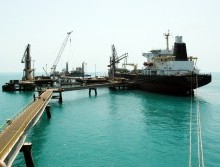
Iran is attacking oil shipping. Oil Tanker. Illustrative. Photo Courtesy of U.S. Navy. Photo by Mass Communication 2nd Class Nathan Schaeffer
The United States took less than one day to publicly accuse Iran of another attack on oil shipping the Middle East, while also saying Iran is threatening “international peace and security.” And it’s not just world peace that’s at stake. The same day, an organization representing shipping warned the situation could threaten the oil supply of the “entire Western world.”
US Secretary of State Mike Pompeo on Thursday listed off a series of threats and attacks carried out by Iran in the last two months, starting with a warning to disrupt the sea-borne oil trade in the region’s Strait of Hormuz. Since then, he said, Iran or its proxies have attacked multiple ships, oil pipelines, US soldiers, and an airport in Saudi Arabia.
“Taken as a whole, these unprovoked attacks present a clear threat to international peace and security, a blatant assault on the freedom of navigation, and an unacceptable campaign of escalating tension by Iran,” said Pompeo in comments to the press published on the State Department website.
The Chairman of the International Association of Independent Tanker Owners (INTERTANKO), Dr. Paolo d’Amico, had his own dire warning after the latest Iran attack on oil shipping. “We need to remember that some 30% of the world’s crude oil passes through the Straits [in the Middle East]. If the waters are becoming unsafe, the supply to the entire Western world could be at risk,” he said in comments posted to the INTERTANKO website.
The INTERTANKO press release said no seafarers were killed and no pollution detected in the sea attack. INTERTANKO further said that the two ships struck on Thursday suffered “explosions at or below the waterline, in close proximity to the engine room while underway. These appeared to be well-planned and coordinated.”
The skill required for the attacks is a key reason why the US blamed Iran. Pompeo said that in addition to findings by intelligence forces, the expertise required for the attacks and the weapons used were among the other indications pointing towards Iran.
“This is only the latest in a series of attacks instigated by the Islamic Republic of Iran and its surrogates against American and allied interests, and they should be understood in the context of 40 years of unprovoked aggression against freedom-loving nations,” said Pompeo.
The top American diplomat noted a twisted diplomatic irony in the attacks, as Japanese Prime Minister Shinzo Abe was in Iran in an effort to encourage Iran to enter talks to de-escalate the situation. Not only did Iran effectively refuse, but Pompeo noted Iran “then insulted Japan by attacking a Japanese oil tanker just outside of Iranian waters, threatening the lives of the entire crew, creating a maritime emergency.”
The situation with Iran has escalated in recent months as American sanctions pressure has tightened in an effort to curb malignant Iranian actions. In response to the pressure, Iran has withdrawn from some restrictions under their nuclear deal with the major world powers and threatened Europe with more Iranian nuclear activity if the Europeans don’t better mitigate US sanctions. Pompeo believes the US sanctions are motivating Iran’s violence as well, but the blame for that is on Iran.
“Iran is lashing out because the regime wants our successful maximum pressure campaign lifted. No economic sanctions entitle the Islamic Republic to attack innocent civilians, disrupt global oil markets, and engage in nuclear blackmail. The international community condemns Iran’s assault on the freedom of navigation and the targeting of innocent civilians,” said Pompeo.
“…Our policy remains an economic and diplomatic effort to bring Iran back to the negotiating table at the right time, to encourage a comprehensive deal that addresses the broad range of threats—threats today apparent for all the world to see—to peace and security.”
(By Joshua Spurlock, www.themideastupdate.com, June 13, 2019)
